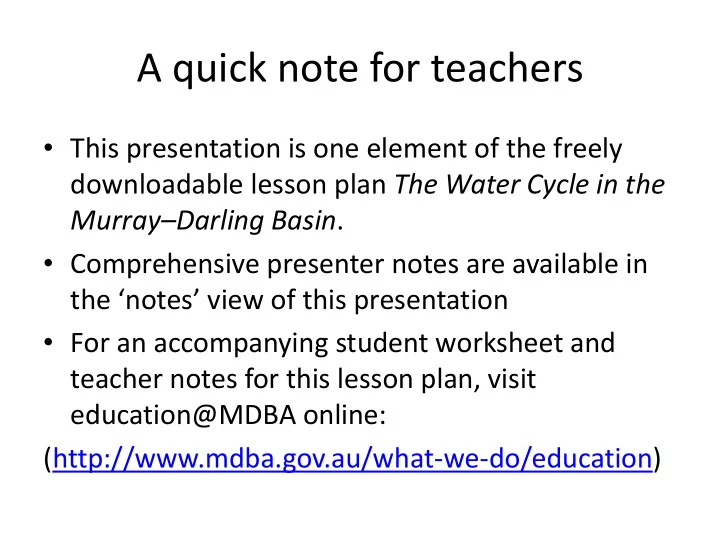

A quick note for teachers • This presentation is one element of the freely downloadable lesson plan The Water Cycle in the Murray–Darling Basin . • Comprehensive presenter notes are available in the ‘notes’ view of this presentation • For an accompanying student worksheet and teacher notes for this lesson plan, visit education@MDBA online: (http://www.mdba.gov.au/what-we-do/education)
education@MDBA the Water Cycle in the Murray–Darling Basin
Lesson overview In this lesson we will learn about: • The parts of the water cycle • How these parts are connected to each other • The water cycle in the Murray–Darling Basin
Lesson keys • Listen to your teacher • Discuss • Play Run the River • Answer • Research • Investigate
Discuss
Play • Play Run the River . As you play, answer the questions on your worksheet.
Research 1.How can we save water in cities, farms or towns. Design an informative brochure outlining why water saving is important and how it can be done. 2.Take a look at the water cycle where you live. Which part of the water cycle brings you the most water?
Investigate In your group, complete one of the following investigation activities. Take careful notes so that you can share your findings. Activity 1 – making clouds
Investigate In your group, complete one of the following investigation activities. Take careful notes so that you can share your findings. Activity 2 – suck it up!
Investigate In your group, complete one of the following investigation activities. Take careful notes so that you can share your findings. Activity 3 –transpiration and evaporation
Investigate In your group, complete one of the following investigation activities. Take careful notes so that you can share your findings. Activity 4 – water under the ground
Recap In this lesson learnt about: • The parts of the water cycle • How these parts are connected to each other • The water cycle in the Murray–Darling Basin
Recommend
More recommend